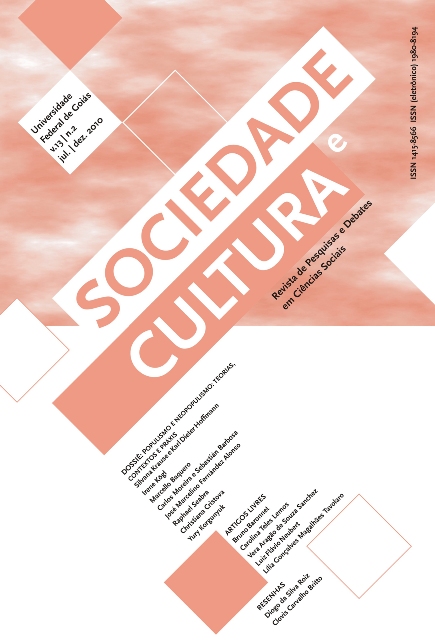Populismo e neopopulismo na América Latina: o seu legado nos partidos e na cultura política
DOI:
https://doi.org/10.5216/sec.v13i2.13421Keywords:
neopopulismo, América Latina, partidos, democracia, cultura políticaAbstract
Nas democracias latino-americanas estão emergindo fenômenos que se supunham ter desaparecido em virtude do surgimento das chamadas sociedades pós-modernas. Um desses elementos é o neopopulismo, sobre o qual continuam a existir divergências a respeito de sua conceitualização e impacto no processo democrático. Este artigo tem como objetivo analisar o neopopulismo, avaliando sua origem e evolução, o impacto nos partidos políticos e o tipo de cultura política que se constitui quando essa práxis política está presente. O estudo, de caráter descritivo-empírico, utiliza dados de pesquisa tipo survey realizada em 2005, em três capitais latino-americanas, com amostras probabilísticas. Os resultados apontam para a presença de predisposições favoráveis dos cidadãos às figuras politicamente populares em detrimento das instituições. Sugerem-se, como conclusão, alguns dispositivos que poderiam se constituir em caminhos alternativos para fortalecer uma cultura política participativa e fiscalizadora dos gestores públicos, valorizando as instâncias de mediação política convencional.Downloads
Download data is not yet available.
Downloads
Published
2011-03-02
How to Cite
BAQUERO, Marcello. Populismo e neopopulismo na América Latina: o seu legado nos partidos e na cultura política. Sociedade e Cultura, Goiânia, v. 13, n. 2, p. 181–192, 2011. DOI: 10.5216/sec.v13i2.13421. Disponível em: https://revistas.ufg.br/fcs/article/view/13421. Acesso em: 3 mar. 2026.
Issue
Section
Thematic Dossier
License
Authors who publish in this journal agree to the following terms:
- Authors retain the copyright and grant the journal the right of first publication, the work being simultaneously licensed under the Creative Commons Attribution License, which allows the sharing of the work with acknowledgment of authorship and of the initial publication in this journal;
- Authors are authorized to enter into additional contracts separately, for non-exclusive distribution of the version of the work published in this journal (eg, publishing in an institutional repository or as a book chapter), with acknowledgment of authorship and of the initial publication in this journal;
- Authors are allowed and encouraged to post and distribute their work online (eg, in institutional repositories or on their personal page) at any point before or during the editorial process, as this can bring productive change as well as increases the impact and the citation of the published work (see O Efeito do Acesso Livre).



